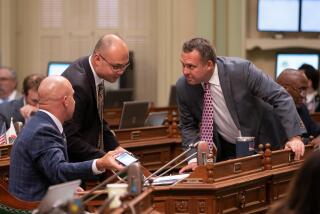Alaska Senator Sells Interests That Prompted Controversy
- Share via
WASHINGTON — Sen. Ted Stevens (R-Alaska) has sold his lucrative interests in Alaska real estate investments with businessmen who had received government contracts or other benefits with his help.
Last week, Stevens disclosed that he had sold the controversial investments over the last year. Stevens and his investments have been the subject of a fact-finding inquiry by the Senate Select Committee on Ethics that he requested following a Los Angeles Times investigation in late 2003. The status of the inquiry has not been publicly disclosed.
“Due to the significant amount of interest in my personal investments in Alaska, I have sold those assets and transferred the proceeds into a blind trust,” Stevens said last week in a statement to Alaska reporters. “These sales occurred at various times last year. All were at commercially reasonable rates.
“I have taken these actions to allow the other investors in those businesses to be free of the attention and interest which resulted from my participation in these investments and to eliminate any suggestion that investments of my assets were inappropriate. I will have no knowledge of investments being made by the assets of the trust.”
Stevens set up the blind trust last month to avoid conflicts of interest, records show. It will be managed by the trust division of Wells Fargo Bank and a certified public accountant, both in Anchorage.
“He did this on his own without any input from the Senate ethics committee,” said William B. Canfield, a Washington lawyer who represents Stevens on ethics matters.
“He is tired of having everyone questioning those investments and his role in them,” Canfield said. “The only way to disabuse the critics was to sell them.”
One of the most powerful members of the Senate, Stevens chaired the Appropriations Committee for six years, until Republican term limits forced him to give up the post this year. He continues to chair the defense appropriations subcommittee, which controls the Pentagon’s budget. He also is chairman of the Senate Commerce, Science and Transportation Committee.
The Times’ investigation described how Stevens became wealthy through relatively modest investments with businessmen and groups he had helped in his role as Alaska’s senior senator.
The article detailed how Jonathan B. Rubini, an Anchorage developer, turned the senator’s $50,000 investment into real estate partnership interests worth between $750,000 and $1.5 million over six years.
At the same time that he was investing with Rubini, Stevens came to the developer’s aid by helping him secure a $450-million housing contract at Elmendorf Air Force Base outside of Anchorage. Stevens did not invest in the Elmendorf project.
In his statement last week, Stevens said he had sold his interests in his real estate partnerships with Rubini.
One of those interests was in a partnership that owns an office building leased for $6 million a year to one of the Alaska Native corporations that Stevens played a key role in creating. These corporations are eligible for no-bid Pentagon contracts because of preferences Stevens wrote into defense appropriations legislation; the corporation that leases the building has received millions of dollars in such contracts.
The exact sales prices that Stevens received were not disclosed, and Senate financial reporting rules ask only for a range, not specific figures.
Stevens told the Senate ethics panel that the initial assets to be placed in trust were cash with a value between $250,001 to $500,000 and an unsecured note with a value of $500,001 to $1 million. Additional details are expected when he files his annual disclosure forms in May.
More to Read
Get the L.A. Times Politics newsletter
Deeply reported insights into legislation, politics and policy from Sacramento, Washington and beyond. In your inbox three times per week.
You may occasionally receive promotional content from the Los Angeles Times.










